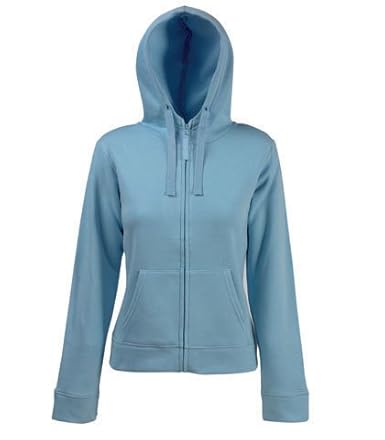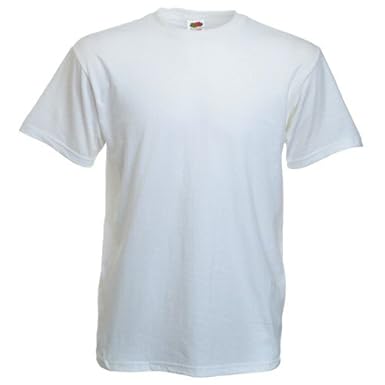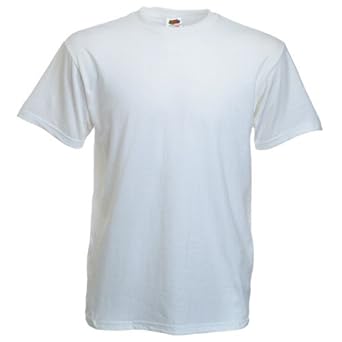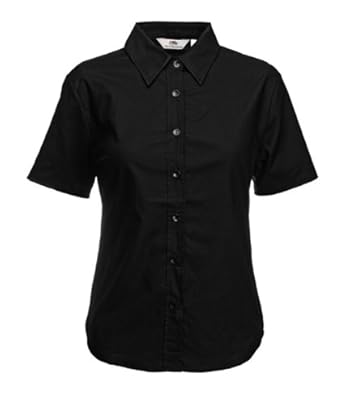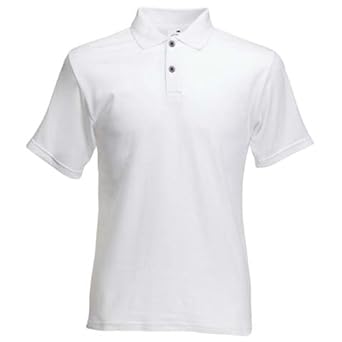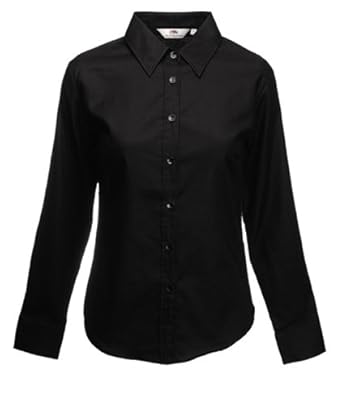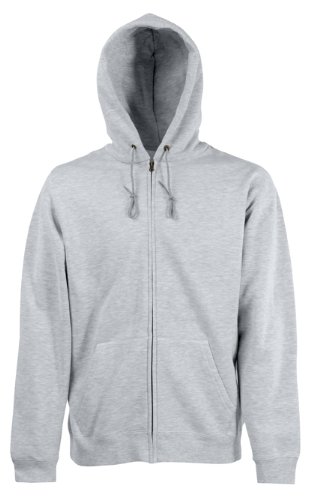
Fruit of the Loom Mens Zip Through Hooded Sweatshirt Hoodie
T-Shirts - Common Terms Explained
By David Urban
T-shirt manufacturers use many terms to describe their products. The terms are not always consistent and it helps to have a reference guide.
The following is the official Green Man T-Shirts Guide to understanding t-shirt terms:
20s, 20/1, 20s single: Unit of measurement that defines the fineness of cotton thread. A standard spool of single-ply cotton thread is comprised of 840 yards of cotton thread. If it takes 20 spools to weigh one pound, then the thread on those spools is referred to as 20s cotton, or 20/1. If 30 spools weigh one pound, then the thread on those spools is referred to as 30s cotton thread, or 30/1. If it takes 40 spools to weigh one pound, then the thread on those spools is referred to as 40s cotton, or 40/1. The higher number means a finer thread, and thus a finer, softer fabric is created. T-shirts made of 30s and 40s are softer, finer, and have better drape than t-shirts made of 20s. The terms are used many ways, but it's the number that counts; "20s," "20/1," and "20 singles" are the same. Threads can be twisted together into thicker strands. If two 20/1 cotton threads were twisted together, it would be referred to as 20/2.
Bamboo Fabric: Rayon made from bamboo cellulose. Although rayon is a man-made synthetic material, most experts agree it is readily biodegradable. Bamboo fabric is extremely soft and has excellent drape.
Bamboo: Fast growing plant, classified as a grass, which can be readily processed into rayon to make bamboo rayon clothing.
Bleach Wash: A process that uses bleach to soften and distress the look of the fabric being washed.
Boat Neck: A very wide neckline that runs across the collarbone area to the shoulder points. Derives from early sailors' shirts, where the wide neck enabled quick removal if the sailor fell overboard.
Boy Beater: Women's fashion answer to the wife beater. A women's tank top, although it can be any color.
Brushed Cotton: A method to remove excess lint and fibers from cotton fabric. Brushed cotton usually has a very soft, smooth finish.
Burn-Out: A process that uses sulfuric acid or other strong acid to "burn-out" parts of a fabric knit, usually a polyester/cotton blend. The process gives a see-through, very sheer effect.
Cap Sleeves: Usually refers to shorter sleeves on women's garments.
Carbon Dioxide: CO2. A chemical compound composed of two oxygen atoms and one carbon atom. Known as a "greenhouse" gas because of its relationship with global warming. A few t-shirt manufacturers are now measuring and recording the CO2 emissions involved in manufacturing their shirts.
Carbon Trust: Independent organization founded in 2001 in Great Britain that monitors carbon emissions. The Carbon Trust works with companies to help reduce their carbon footprint, and now certifies companies and products as having a "low carbon" or "no carbon" footprint. A few t-shirt companies now manufacture "low carbon footprint" t-shirts.
Carding: A fiber cleaning process that eliminates short fibers and removes dirt and foreign matter. Carding can be done by hand or by large machines using drum rollers. Carded-only cotton is not as desirable as combed cotton.
Cellulase Wash: Another name for enzyme wash. This gives fabric a soft feel and a vintage look, depending on how the wash is done.
Cellulose: Derived from the cell walls of certain plants. Useful in making certain types of fabrics, including acetate, triacetate, and rayon. Bamboo fabric is actually rayon made from bamboo cellulose.
Cheap Cotton T-Shirt: T-shirts made with carded cotton, using 18/1 thread, usually knitted on 20 gauge machines. These t-shirts are coarse, rough, and have poor drapability. Used often as cheap promotional give-aways.
Climate Neutral: A term used to describe a company, process, or product that has zero impact on the Earth's climate. A few t-shirt manufacturers advertise their company as climate neutral.
CO2: Carbon dioxide. A chemical compound composed of two oxygen atoms and one carbon atom. Known as a "greenhouse" gas because of its relationship with global warming.
Colorfastness: The ability of a garment to withstand multiple washings without losing its color.
Combed Cotton: A method to remove short fibers and to arrange longer fibers parallel to create a smooth, fine cotton yarn. Combed cotton has high strength, excellent uniformity, and better hand. Combed cotton costs more and is used in finer t-shirts.
Compacting: A process that compacts the space between cotton fiber pockets. Helps to reduce shrinking.
Contrasting Stitching: Stitching with a different color than the garment. Gives a nice design detail in t-shirts.
Control Union: An international organization that offers certification services for a variety of programs--including many organic certification programs. Certifies USDA Organic, as well as GOTS (Global Organic Textile Standard).
Cotton Jersey: Knitted, very slightly stretchy fabric with a smooth flat face and a more textured but uniform back. Average weight per yard is about 5.5 to 6 ounces. Basic t-shirts are made of cotton jersey. Fine cotton jersey is usually smoother and has a lighter weight per yard.
Cotton: A natural fiber that is the most popular in the world for fabrics. Cotton fibers are usually ½ to 2 inches long. Longer fibers produce finer cotton fabric. Varieties such as Pima and Egyptian, which feature fibers exceeding 1.5 inches, are more highly valued than ordinary varieties.
Crew Neck: A round close-fitting neckline. Most common neck on t-shirts.
Crop Top: A shirt with a short body to it; made to expose the midriff area.
Double-Needle Stitched: Used mostly on sleeve/bottom hems and refers to a parallel row of stitching. This type of stitching gives durability and a cleaner, more finished look.
Drape, Drapability: Refers to how a fabric hangs. A fabric like bamboo rayon has excellent drape, while a coarse fabric like burlap has very little. T-shirts that have good drape qualities feel nicer to wear.
Drop Tail: A garment that features a longer back than front.
Eco-Friendly: Extremely loose term that refers to a product's "greenness." Almost useless in realistically assessing a product. Favorite term used by green washers.
Egyptian Cotton: Cotton produced in Egypt and valued for its long length of fiber. Apparel made with true Egyptian cotton is prized for its softness and fineness.
Environmental Justice Foundation: A registered charity established in 2000 to help people who suffer most from environmental abuses such as pesticide poisoning, water depletion, and soil destruction. Especially active in curbing abuses in cotton farming.
Enzyme Washed: A wash process using special enzymes to produce a soft finish and smooth look to a fabric. Ages dyes to create a special look to dyed fabrics. Enzyme washing is physically less harsh on the fabric compared to stone washing.
European Cut: A style of t-shirt that is narrower than what one normally finds. For example, a full cut men's t-shirt, size large, usually runs 22 inches across the chest (measured one inch below the sleeve). A men's large European cut will run about half an inch to 1 inch narrower, sometimes more.
Fabric Dyed: Fabric dyed before being cut and sewn into a finished piece of clothing.
Fair Labor Association: A nonprofit organization dedicated to ending sweatshop conditions in factories worldwide. Works to develop Code of Labor Practices, especially important in the apparel business where working conditions have historically been so poor.
Fair Wear Foundation: An international group dedicated to enhancing garment workers' lives all over the world. Works with companies that produce clothing and other sewn products and that take responsibility for their supply chain.
Fine Cotton Jersey: Knitted, very slightly stretchy fabric with a smooth flat face and a more textured but uniform back. Fine cotton jersey is usually smoother and has a lighter weight per yard than regular cotton jersey. T-shirts made with fine cotton jersey have a better drape and feel than regular t-shirts. Usually made with 30s and higher cotton thread, and weighs about 4.3 ounces per square yard.
Fitted Cut: Definitions vary, but generally a fitted cut refers to a cut that flatters the body. Used often in women's t-shirts, the middle section of the shirt will be tighter than the top or bottom. Overall, the shirts run narrower than a basic full cut.
Full Cut: A generous, roomy cut. In t-shirts, tubular styles are generally considered full-cut, but there are exceptions. Full Cut differs from the slimmer European Cuts, Slim Cuts, and Fitted Cuts.
Garment Dyed: Clothing dyed after it has been cut and sewn into a finished article of clothing.
Garment Washed: A process where finished articles of clothing are washed, usually with added softeners to improve the feel and look of the fabric.
GMO Free: GMO stands for Genetically Modified Organisms. First used in the 1990s when consumers became worried about genetically modified food. Many companies now apply the GMO free label on everything from food to natural fabrics, like cotton.
GOTS: Stands for Global Organic Textile Standard. A project of the International Working Group. They have developed standards to ensure organic status of textiles, from the harvesting, manufacturing, and labeling, in order to provide a credible assurance to the end consumer. An organic t-shirt that meets the standards can be GOTS certified.
Green: Generic term used by marketing gurus to promote products. Another favorite term of "green-washers," who are hopping on the environmental bandwagon without any real commitment.
Green-Washing: Take off on the term "white-washing," but in an environmental context. Companies that green-wash are paying lip-service to environmental concerns to attract more business, but haven't taken any real steps to be environmentally responsible.
Hand: The way a fabric feels to the touch. A fabric that feels soft and smooth is considered to have a good hand.
Hemp Fabric: Hemp, or Cannabis sativa, has been used for fabric for thousands of years, mostly as an industrial fabric. Newer processing methods have made it suitable for finer clothing, and now it is used in many clothing articles, including t-shirts. Hemp is valued for its strength and durability.
Henley T-Shirt: Similar to a collarless polo shirt, a Henley is a pullover t-shirt featuring 2 or 3 buttons (sometimes up to 5 buttons are used, but that's uncommon). A Henley can be either short or long sleeved.
Ice Wash: A method of stone washing where the stones are first soaked in a solution of potassium permanganate. This method produces a frosted appearance to fabric.
Interlock Knit: A type of knit that is very soft and has a good drape. Interlock knit stitches are tighter, more stretchy than Jersey knit, but less stretchy than rib knit. Used in very fine garments.
Jersey Knit: Commonly found in t-shirts and is the most durable of knits. It is light weight, and has fine vertical ribs. The Jersey knit was named after the British Island in the English Channel. Fine cotton Jersey refers to Jersey Knit made with fine cotton threads such as 30s and 40s.
Knit: Defines how the interlocking loops of yarn that make up fabric were made. There are many types of knits. Jersey Knit is commonly found in t-shirts and is the most durable of knits. It is light weight, and has fine vertical ribs. On the other hand, rib knits have heavy ribs running down the fabric, while interlock knits are used in very fine fabrics. T-shirt collars are usually rib knit.
Muscle Shirt: Sleeveless style t-shirt, but not exactly a tank top. Basic t-shirt, just without the sleeves. The shoulder strap portion is much wider than an ordinary tank top.
Neck Tape: A thin strip of fabric sewn over the seam running across the shoulders and neck area. It covers the seam and looks better than an exposed stitch. Often referred to as "shoulder to shoulder taped."
OekoTek 100: Certification from the International Oeko-Tex® Association, which assures consumers that the apparel they buy is chemical free and poses no risk to their health. Under the Oeko-Tex standard, clothing must be free of formaldehyde, arsenic, lead, cadmium, and other toxic chemicals.
Organic Apparel: A term very loosely applied in the garment industry. It can mean anything from 100% organic to as little as 6% organic. Often combined with terms like Eco-Friendly, Green, and so on. Consumers must check the labels and verify the materials used to see if something is truly organic or not.
Organic Cotton: Cotton grown without the use of pesticides. Certified organic cotton has been inspected to insure it truly is organic.
Organic Soil Association: Founded in 1946 by a group of farmers, scientists and nutritionists concerned about the relationship between farming practices and plant, animal, human, and environmental health. The Organic Soil Association pioneered the first organic standards in 1967, and certifies farms and businesses that meet those standards.
Overdyed: A process where previously dyed garments or fabrics are dyed with an additional color to create a unique look.
Performance T: Name for t-shirts manufactured for athletes and outdoor enthusiasts. Performance Ts are characterized by their breathability, moisture wicking, fast drying, and odor control capabilities. Many performance Ts are polyester/cotton blends, or can also be 100% polyester. Bamboo t-shirts, due to their absorbency and wicking properties, have become known as performance t-shirts, although they do not dry as fast as performance t-shirts made of 100% polyester.
PFD: Stands for Prepared For Dyeing. Sold this way to t-shirt customizers who want to create their own look with dyes.
Pigment Dyed: A type of dye that creates a washed out, distressed look.
Pima Cotton: A cotton developed in the U.S. in the early 1900s to compete with Egyptian cotton. It features longer fibers and is used often in fine men's and women's shirts. The name Pima comes from the Pima Indians, who helped with the first crops of the new cotton as it was first grown in the U.S.
Pique: A method of knitting that creates a waffle-type, fine textured surface. Used often in polo shirts.
Polyester: Man-made fiber manufactured from synthetic polymers. Used widely in apparel, especially combined with cotton in 50/50 blends.
Pre-Shrunk: Refers to the process of pre-shrinking fabric before it is cut and sewn. Occasionally it refers to an actual finished garment that has been preshrunk. Clothing that has been preshrunk shrinks less once the buyer washes it. Preshrunk cotton t-shirts will still shrink a bit, however, especially if dried using a clothes dryer.
Raglan T-Shirt: Style of t-shirt featuring sleeves that run directly to the collar. Usually the sleeves are a contrasting color from the body. Raglan sleeves are wider under the arms, and are preferred by wearers who want maximum freedom of movement. Baseball t-shirts usually feature a raglan sleeve style.
Rayon: Man-made fiber that uses plant cellulose as its main ingredient. Rayon is very soft, has excellent drape, and is very absorbent. Originally developed as a silk substitute.
Rib Knit: Characterized by heavy vertical ribs running down the fabric. Rib knits are usually classified as 1x1, 2x1 or 2x2. This lets you know the width of the rib compared to the space between. For example, a 1x1 rib knit or a 2x2 rib knit means the space between each rib is the same width as the ribs. But a 2x1 rib knit means the ribs are twice as wide as the spaces in between. Rib knit is very stretchy and is often used for t-shirt collars, cuffs, and tank tops.
Ring Spun: Refers to yarn made by twisting and thinning a rope of cotton fibers. The continuous spinning results in a softer feel and stronger yarn. Ring-spun t-shirts are noticeably softer to the touch.
Ringer T: A t-shirt with colored sleeve bands and matching crew neck. Most ringers are white, with the armband sleeves and crew necks in various colors.
Sand Wash: Refers to using sand while washing a garment or fabric to soften and distress it.
Satin Washed: Another term for silicone washed, which produces a very smooth and soft finish to fabric, and also gives the fabric good draping properties.
Scoop Neck: Wide, gently curved neckline that varies in depth. Favored in women's shirts.
Sheer Jersey: Very light weight jersey knit, weighing about 3.9 ounces per yard. A little stretchier than fine jersey.
Shoulder to Shoulder Tape: A thin strip of fabric sewn over the seam running across the shoulders and neck area. It covers the seam and looks better than an exposed stitch.
Shrinkage: Usually refers to cotton apparel and the amount it can be expected to shrink. Most cotton t-shirts are pre-shrunk, but 4-5% shrinkage can still be expected.
Side Seamed: Refers to shirts with a seam running down at each side under the arm sleeves to the bottom hem. Side seamed t-shirts are more expensive to manufacture.
Silicone Washed: Refers to using inert silicone in a washing process. Produces a very smooth and soft finish to fabric, and also gives the fabric good draping properties.
Singlet: another term for a men's tank top.
Slim Cut: A style of t-shirt that is narrower than what one normally finds. For example, a full cut men's t-shirt, size large, usually runs 22 inches across the chest (measured one inch below the sleeve). A slim cut will run about half an inch to 1 inch narrower, sometimes more.
Stonewashed: A washing process that uses lava rocks or sometimes silicon and rubber balls. This method makes fabric softer and gives it an aged or distressed look. Sometimes bleach is used in this process.
Tank Top: T-Shirt characterized by thin shoulder straps and no sleeves. The name came from the early term for swimming pools: swimming tanks.
Taped Seam: Not actual "tape," but a thin strip of fabric sewn over the seam running across the shoulders and neck area of t-shirts. It covers the seam and looks better than an exposed stitch.
Tubular Style:A style that has no side seams; the body of the t-shirt is round and straight. Tubular t-shirts are less expensive to manufacture, and make up the bulk of the cheaper t-shirts.
Unisex T-Shirt: No standard definition exists for a unisex t-shirt, but generally speaking a unisex t-shirt is made of lighter weight, fine cotton jersey, side seamed, and not cut as full as a regular men's t-shirt. The sleeves are not extra short, like cap sleeves, but are not full elbow lengths either. The body length is usually medium/long. However, there are wide variations in unisex t-shirts, depending on the manufacturer.
Uzbekistan: Former U.S.S.R. satellite that became independent in 1991 and is notorious for its cotton production methods, which include forced child labor and environmentally destructive practices. Ethical apparel companies boycott Uzbekistan cotton; however, many companies don't care and have refused to join in the boycott because Uzbekistan cotton is cheap.
V -Neck: Inverted triangle style of neckline. Can be deep or shallow, depending on the style. Usually favored by women, but a shallow style v-neck is popular among men.
Viscose: Typically another name for rayon, as in viscose rayon.
Weight: Usually expressed ounces per square yard. A 5.5 ounce weight cotton fabric means that one square yard will weigh 5.5 ounces. Fine jersey cotton fabrics usually have lighter weights, while coarser cotton fabrics have heavier weights.
Wife Beater: Derogatory term for a men's tank top t-shirt. Usually refers to a basic white tank top.
Yarn Dyed: Yarn that is dyed before it is woven into a fabric.
David Urban is an avid hiker, backpacker, and environmentalist who has traveled extensively across the American Southwest. He is also the owner of Green Man T-Shirts, supplier of organic t-shirts featuring designs by artist Rob Juszak, which donates 25% of all profits to environmental groups.
Article Source: http://EzineArticles.com/?expert=David_Urban
http://EzineArticles.com/?T-Shirts---Common-Terms-Explained&id=3647057
Click to>>>Bestseller fruit of the loom shirt